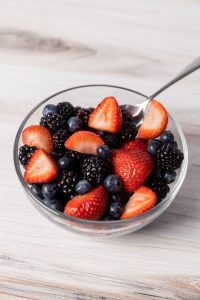Strawberry season is in full swing, and it is time to take advantage of their availability and health benefits. In addition to being gorgeous and delicious, strawberries are incredibly versatile. These ruby gems are also potent health protectors. Here are some of their impressive benefits and simple ways to incorporate strawberries into meals, snacks, and treats.
One cup of whole strawberries provides just 46 calories. The same portion sliced contains 53 calories; and a cup of pureed berries packs only 74 calories. A one-cup portion of strawberries also contains over 100% of the daily minimum target for immune-supporting vitamin C. In addition to functioning as a disease- and age-fighting antioxidant, vitamin C helps make collagen and maintain skin health. Strawberries also contain manganese, a mineral that also helps produce collagen, promote skin, and bone health.
 Strawberries are also rich in other antioxidant and anti-inflammatory compounds. This is one reason why berries, including strawberries, are tied to brain health. In one study, older women who consumed at least one to two servings of strawberries (with one serving being eight whole berries) per week, experienced a reduced loss of cognitive functioning.
Strawberries are also rich in other antioxidant and anti-inflammatory compounds. This is one reason why berries, including strawberries, are tied to brain health. In one study, older women who consumed at least one to two servings of strawberries (with one serving being eight whole berries) per week, experienced a reduced loss of cognitive functioning.
Eating strawberries at the end of a meal has been shown to help regulate blood sugar and insulin levels. That translates to steadier mental and physical energy. It may also help lower the risk of type 2 diabetes, obesity, and heart disease.
Good-for-you plant compounds, called flavonoids, in strawberries are tied to a reduced risk of age-related weight gain. The effect may be due to flavonoids’ ability to increase glucose uptake in muscle, and/or decrease glucose uptake in fat tissue. The fiber in strawberries (about 3 grams per cup) helps maintain good digestive health by supporting the growth of healthy gut bacteria, which are tied to immunity, anti-inflammation, and mood.
In people with osteoarthritis, strawberries have been shown to help reduce pain and markers of inflammation and oxidative stress—an imbalance between the production of cell-damaging free radicals and the body’s ability to counter their harmful effects. Berries, including strawberries, have also been tied to cancer protection, possibly by fighting tumor formation and stopping the growth and spread of cancer cells. Strawberries have also been shown to protect the heart by reducing inflammation, boosting good HDL cholesterol, protecting against the oxidation of bad LDL cholesterol (a precursor to artery hardening), and improving circulation.
How to enjoy more strawberries
You can enjoy strawberries as is or use them to whip up a smoothie; top off overnight oats or oatmeal; in a fruit parfait with yogurt and granola; on top of pancakes, waffles, or whole grain cereals; add to water to infuse it; make homemade jam; dip in melted chocolate or whipped cream; enhance savory meals, such as your favorite salad, stir fry, or whole grain dish.
Resources:
Dietary intakes of berries and flavonoids in relation to cognitive decline. Devore, E.E., Kang, J.H., Breteler, M.M.B., and Grodstein, F. Retrieved January 8, 2022, from https://pubmed.ncbi.nlm.nih.gov/22535616/
Are strawberries good for you? Benefits, nutrition and more. Ware, M. RDN, L.D. Retrieved January 8, 2022, from https://www.medicalnewstoday.com/articles/271285#benefits
 0
0
